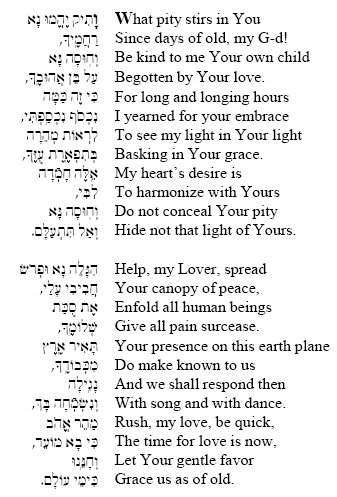Shalosh Seudos Time and Weekday Davvenen
The following is a transcription of Reb Zalman speaking at the recent Shavuot retreat. Please scroll to the bottom for a copy of Reb Zalman’s singing translation of Yedid Nefesh. Gabbai Seth Fishman, BLOG Editor.
“The last few years, I’ve felt that it is important to draw back from leadership so that I can really put my energy in highlighting what’s most critical:
“In terms of the innovations we’ve made in the Jewish services, we are doing good Friday nights. ‘We give good Friday night.’ People come and they dance and it’s freilach and they love each other and ‘v’ahavta l’rayacha kamocha’ / love thy neighbor as thyself and Shema Yisroel / Hear Oh Israel. And we did pretty good with Shabbos morning, because everywhere, little by little, the notion of not calling up the ‘Mr. Goldberg-s,’ i.e., the ones who would give a big donation to the shul, (he gets this aliyah and this one gets that aliyah), has been replaced by saying to people, ‘We’re going to read in the torah about such and such a thing. Do you feel this deep? Then you come up to the torah here.’ So we’ve done something remarkable with shabbos morning too.
“What we haven’t yet done well is shalosh seudos. This means the Shabbos afternoon time. Also, I’m still worried about us not doing enough weekday davvenen.
“The Baal Shem Tov had a wonderful saying: ‘Why is it Friday night you eat at home, Shabbos noon you eat at home, but for shalosh seudos you come to the shul with a little stikele herring and you sit around with other people? Why is it?’ And he said, ‘Because you don’t want to die alone.’
“Since the additional soul goes away at the end of Shabbos, it’s a little death. We want to experience that with other people around.
“Imagine: We are singing with longing some niggunim / melodies. And the question coming up for us is, ‘Gewalt! Gewalt! With what will I go into the next week?’ ‘Have I got enough energy?’ ‘Have I got enough direction and guidance for the next week?’
“To be able to sit together with other people and maybe even have a little conversation about that, how wonderful.
“Rick Warren (http://saddleback.com/index.html) God bless that guy. He gave an invocation at the inauguration, (click here to watch it), and I was so proud of him at that time and the menschligkeit that he showed. He takes bible literally, and sometimes, on a Sunday morning, he has a congregation of some 22,000 people. How does that keep together? Because they meet during the week. And they ask, ‘How will I live a life driven by purpose?’ And they sit and they talk to each other.
“So I feel that it’s very, very important that we make a tikkun for shalosh seudos for the time when Shabbos goes away. Not just the havdalah service which is sort of seen as “I’m glad Shabbos is over,” but the lingering with the Shabbos feeling and experiencing the longing.
“I want to say that regardless of the best upaya / the best skillful means that Eastern religions have brought to us, if these skillful means don’t also include the longing then they will not be enough to ensure our survival as renewal Jews. It will be a one generation phenomenon. We need to have (Psalm 42), ‘Matai avo v’eraeh p’nei Elokim’ / ‘When will I come and see the face of God?’ Without enough longing time together, without allowing something to draw us, without spending time with the longing, how can we do it? When one can go to a place where one sings a song, hears some music, it makes a space for one to ask oneself, ‘with what do I go into the week?’
“I think we need to do a tikkun / repair on that.
“Another thing from the Shabbos afternoon time that needs tikkun is having people come over to the house, being together with them and sitting and singing. Not so much verbal stuff, rather, telling a story perhaps, or like a Quaker meeting, sometimes singing a niggun but then, if someone has an insight that s/he wants to share, sharing in a one sentence form: It’s a good idea to do these things at this time.
“But as I was saying too, I’m still worried about the weekday davennen. Because I know that most people who consider themselves good Jews belonging to a shul, renewal and all that, comes Monday morning they don’t davven.
“I don’t want to give you mussar / directives and say, ‘You ought to davven! You must davven!’ I want to say ‘Oy gewalt! How are you going to make it through Monday? How are you going to make it through Tuesday?’ You need to be able to Davven weekdays.
“It’s for this reason that I went and translated the weekday davennen into an English that isn’t like, ‘vouchsafe’ and ‘bestow,’ so that one can speak in a way that resonates with one’s heart, so that one will connect to the text and feel how it pulls one. And I’d like you to try it for a while. You will see that after a while you won’t even need the book. You’ll put it down because you will have learned to be able to speak directly to God from the heart.
“Not too long ago, Terry Gross was interviewing Gene Robinson, the openly gay bishop from New Hampshire, and she asked him, ‘How do you pray?’ ‘What’s your prayer like,’ and among the things he said was, ‘The best prayer is when I just sit and let God love me.’ I want to tell you, it touched me so much that I sent him a fan letter.
“Because when we say ahavat olam ahavtanu / we are loved by an unending love, we never give enough time to allow it to happen; we hang up the phone right away. To be able to say, ‘I will sit in Your presence and let You love me’ especially when I’m davenned out, is really important: (Psalm 102), Tfilah l’ani ki yaatof v-lifnei Adonay yishpoch siho / A prayer for the poor person who pours out his heart before God.
“That’s the kind of possibility, that friendship with God that is fueled by longing and gives us that element that sometimes goes with words and sometimes goes without words, but basks in the presence of God, that will really satisfy a deep need. So when we sing Yedid Nefesh, that’s what ‘b’har’ot lah noam zivecha‘ / ‘please God, let us be in Your presence’ is about. Let us feel. ‘I really want to see You in this thing.'”

